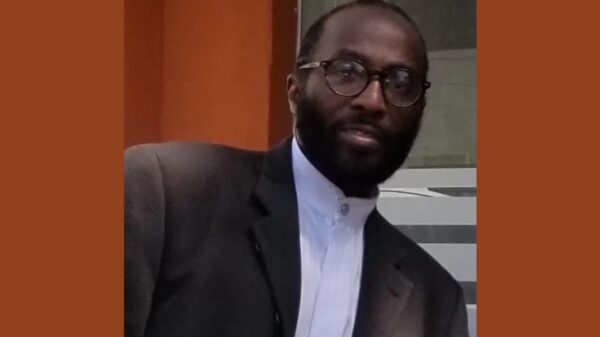By Tchernavia Montgomery
Tchernavia Montgomery is the chief executive officer of Care Ring, a nonprofit that provides health services for the uninsured, underinsured or those lacking access to affordable, high-quality preventive health care.
In March of 2021, in the midst of the pandemic, the board of directors at Care Ring selected me to become part of a humble cohort of nonprofit executive directors and CEOs, nationally.
That is, the 10% who are people of color.
I am grateful for the courage this board showed in hiring me, and more.
To paraphrase the words of the immortal Shirley Chisolm, I didn’t have to bring a folding chair, because a seat was made for me at the table.
As the first minority to lead our organization since its founding in 1955, I’m newly enlightened to the tremendous challenges and opportunities for leaders of color within the nonprofit space.
A recent study titled “Which CEOs Are Leaving Quickest?” found that nonprofit CEOs accounted for 22% of all CEO departures in 2022. Those boards of directors had to select new leaders amidst a raging global epidemic.
Facing unprecedented challenges, many organizations were inspired to reevaluate and reimagine their purpose. This included discussions on leadership equity.
We see this now on many fronts in Charlotte. Our community is actively striving to deepen its social justice efforts with sustainable initiatives, including the Mayor’s Racial Equity Initiative, Bank of America’s $1.25 billion effort to advance racial equality and economic mobility in business sectors, and the United Way of Greater Charlotte’s support of programs that seek to dismantle systemic and historical barriers to equity in the nonprofit sector.
Care Ring is embracing this challenge, as well. Our unique position in the community allows us to serve the medically uninsured and underinsured of Mecklenburg County. Ninety-four percent of our patients are people of color. Thus, as a trusted pillar of community-based care, we understand our role to act as a voice for the historically marginalized.
Incredibly responsive to this need, Care Ring entered last fall with a more diverse board. Now, 50% of its members represent racial or ethnic minorities, up from 12% in the year prior. We accomplished this through intentional recruitment. Note that 80% of nonprofit board members nationally are non-Latinx white. Thus, I am grateful for my board’s decision to courageously engage in decisive action.
I urge other nonprofits to consider whether the communities they serve can see a reflection of themselves in organizational leadership. And does a lack of racial and ethnic equity extend to boards of directors? This is not a call to replace, but to add and enhance, for we are strengthened in our collectivity.
To avoid tokenism, I also encourage boards to select leaders based on an acknowledgment of their unique abilities and skills, rather than their race or ethnicity. Leaders desire to be seen for their potential to build upon an organization’s existing strengths.
Our learning curves can vary. Our social capital may look different. Our invisible barriers to success may impact our ability to freely move about unhindered. And, our fear of failure is amplified as we are often “firsts” in our roles with challenges unknown to our predecessors.
We are pioneers. We accept that change will not be easy. However, as James Baldwin wrote, “Not everything that is faced can be changed, but nothing can be changed until it is faced.”
Fundraising, for example, sometimes requires innovation. I, myself, am fairly new to nonprofit fundraising. I’ve joked on occasion that I find it a challenge to convince one individual donor to write me a $5,000 check. However, I can consistently depend on my network to support me with a hundred $50 donations in response to a single social media plea for a critical need. Similar to those we serve, leaders of color can draw upon their innate strengths to cover an existing deficit. I am a reflection of my whole community, and I carry them with me each day that I serve.
Uniquely, leaders of color possess valuable assets, including life experiences. Many are internally driven to serve based on their own personal journeys. As a former teen parent, a beneficiary of entitlement services, and even a patient decades ago at the same organization I now lead, my internal motivation is unyielding. Our identities and culture are often incredibly proximate to those we serve. There is value in relatability.
I’m inspired by influencers and decision-makers who’ve chosen today to intentionally revise and/or create policies and frameworks for tomorrow that seek to disrupt yesterday’s norms.
I didn’t safely arrive from my journey in poverty alone. Today, I’m still supported by a diverse group of kind-hearted individuals who practice what Jhaymee Tynan advises as the “5 C’s” of sponsorship. In her book, “Inclusive Sponsorship,” she shares that candidness, courage, commitment, connection, and capital are most beneficial in helping women of color navigate career advancement challenges.
Now that I’m conscious of “what works,” I challenge us all to make choices that uphold our aim to be a region that supports inclusionary mobility for all who seek it. Glass ceilings are transparent and glass cliffs can be bridged.
As I approach my two-year anniversary as Care Ring’s chief executive officer, I plead to you this: For true community transformation, we must have the courage to disrupt the system. Let’s transparently evaluate where notable absence exists. Then, let’s commit to removing historical obstacles to advancement. This can be accomplished through strategic policy changes and the development of support systems that address challenges faced by aspiring nonprofit leaders of color.
Then, and only then, can we create fairer opportunities for those entering the race to lead.









You must be logged in to post a comment Login